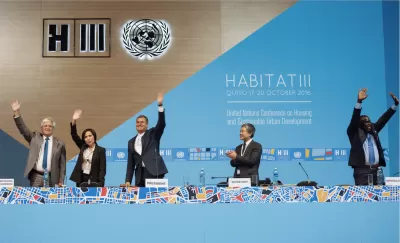The United Nation’s New Urban Agenda has created a playbook for planning advocates. It opens possibilities for building inclusive, integrated urban planning in countries where planning has been top-down and limited in scope.

The U.N.'s New Urban Agenda is positioned as a playbook for implementation of Sustainable Development Goal 11: Sustainable Cities and Communities. It has the potential to elevate the profile of urban planning in many countries and to spread the so-called reinvention of urban planning as inclusive, bottom-up, and integrative. Yet the New Urban Agenda has clear roots in a government-centered, modernist practice of planning that has been discredited by planning theorists in recent decades, and any global template for planning runs the risk of tone-deafness to the unique characteristics of individual countries.
"Planners and the New Urban Agenda: Will we lead the agenda, or will the agenda lead us?" an article just published (open access for a short time) in Town Planning Review, examines the origins and development of the New Urban Agenda, examines its planning components, assesses its challenges, and recommends strategies for maximizing outcomes that emphasize broad stakeholder engagement, cross-sectoral planning integration, and national and sub-national choice in the design of planning processes and solutions. Critically, the article considers the demands of corporate power, the new regionalism, and growing theorizing in the Global South, as contests to dominant planning paradigms of the 20th century that demand responses if planning is to fulfill the needs of today's cities and regions.
I urge planning agencies, firms, associations, and individual planners to seize the momentum created by the New Urban Agenda to take bold steps to promote new planning programs and to reinvigorate and redirect existing programs. We need a substantial increase in global planning capacity, broadening of the engagement of the full range of stakeholders in planning processes, recognition that planned action involves far more than plan making, and most importantly, commitment that planning must be locally or nationally determined while informed by international experience.
This is a pivotal moment in global urban development. Rapid urbanization, climate change, and economic restructuring are pressuring environmental, social, and fiscal resources near breaking points. International sharing of planning ideas, tools and methods is critical to success, but to work well must be done with respect for political, economic and cultural contexts. The New Urban Agenda, endorsed without dissent by the United Nations member states, provides a powerful framework for the needed context-sensitive, professionally-informed policy making and design.
"Planners and the New Urban Agenda: will we lead the agenda, or will the agenda lead us?" Town Planning Review 92 (4): 421-441, is available in open access for a short promotional period from Liverpool University Press.

Alabama: Trump Terminates Settlements for Black Communities Harmed By Raw Sewage
Trump deemed the landmark civil rights agreement “illegal DEI and environmental justice policy.”

Study: Maui’s Plan to Convert Vacation Rentals to Long-Term Housing Could Cause Nearly $1 Billion Economic Loss
The plan would reduce visitor accommodation by 25% resulting in 1,900 jobs lost.

Planetizen Federal Action Tracker
A weekly monitor of how Trump’s orders and actions are impacting planners and planning in America.

Wind Energy on the Rise Despite Federal Policy Reversal
The Trump administration is revoking federal support for renewable energy, but demand for new projects continues unabated.

Passengers Flock to Caltrain After Electrification
The new electric trains are running faster and more reliably, leading to strong ridership growth on the Bay Area rail system.

Texas Churches Rally Behind ‘Yes in God’s Back Yard’ Legislation
Religious leaders want the state to reduce zoning regulations to streamline leasing church-owned land to housing developers.
Urban Design for Planners 1: Software Tools
This six-course series explores essential urban design concepts using open source software and equips planners with the tools they need to participate fully in the urban design process.
Planning for Universal Design
Learn the tools for implementing Universal Design in planning regulations.
Caltrans
Smith Gee Studio
Institute for Housing and Urban Development Studies (IHS)
City of Grandview
Harvard GSD Executive Education
Toledo-Lucas County Plan Commissions
Salt Lake City
NYU Wagner Graduate School of Public Service






























